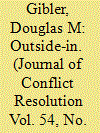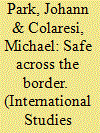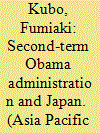| Srl | Item |
| 1 |
ID:
138637


|
|
|
|
|
| Summary/Abstract |
During his China visit, Prime Minister Narendra Modi’s unusual candour in speaking about the problems that hold back the India-China relationship is a refreshing change from the past discourse of emphasising only improved border management and acceptance that the border issue will take a long time to resolve and should not impede the rest of the relationship from moving forward.
|
|
|
|
|
|
|
|
|
|
|
|
|
|
|
|
| 2 |
ID:
100942


|
|
|
|
|
| Publication |
2010.
|
| Summary/Abstract |
Although centralization is thought to be a common response to external threats to the state, few theories develop the mechanisms by which domestic centralization occurs. Fewer still consistently demonstrate that centralization is indeed a common response to external threats in all states. This article therefore develops a comprehensive theory of domestic change in the shadow of external threat. Salient threats to the state create strong incentives for opposition forces to support the leader in power, even in non-democracies. The leadership then uses these favorable domestic political climates to decrease the number of institutional veto points that can stop future leader-driven policy changes. Collectively, this two-part theory provides a unified model of domestic behavioral change (also known as rally effects) and institutional centralization (defined by a declining number of veto players). In addition, by defining salient threats as challenges to homeland territory, the article provides some of the first domestic-level evidence that territorial disputes are fundamentally different from other types of international conflicts.
|
|
|
|
|
|
|
|
|
|
|
|
|
|
|
|
| 3 |
ID:
131003


|
|
|
|
|
| Publication |
2014.
|
| Summary/Abstract |
We investigate the research findings reported in Gibler (2007) that suggest the democratic peace is in fact a spurious artifact of stable borders. If corroborated, this set of findings would mark an important reorientation for the field. However, we show that the research design used in Gibler (2007) suffers from several problems, including omitting the lower order terms of interaction variables and inappropriately assuming cross-dyad independence of artificially created dyadic democracy scores. Our replication and extension shows that even when controlling for stable border variables, democracy continues to be a consistently useful predictor of international conflict. Further, the stable border variables themselves prove to be less consistent predictors of both peace and democracy as compared to previous research. These results suggest that both territorial issues and democracy can coexist as explanations for interstate bellicosity.
|
|
|
|
|
|
|
|
|
|
|
|
|
|
|
|
| 4 |
ID:
120178


|
|
|
|
|
| Publication |
2013.
|
| Summary/Abstract |
The controversy in the Unites States on how to deal with the "fiscal cliff" revealed not just a deep ideological difference between the Democratic Party and the Republican Party but also a new sign of a possible crack of the conservative Republican ranks between those Republicans close to the Tea Party and those who favored the tax hike for the wealthy in order to save the tax cut for the rest of the people.
The planned deep cuts in the defense expenditure will have important implications for national security of Japan, which recently experiences increasing tension with China over the Senkaku Islands. The Obama Administration adopted a tough stance with China over the territorial issues in the South China Sea in July 2010. Rebalance to Asia could be understood, at least in part, to be a response to the rise of China, in a financial situation with fewer resources available for the national defense in the US.
The logical conclusion for Japan and the US would be for both of them to deepen security cooperation. Shinzo Abe, the new Prime Minister of Japan, should further clarify his foreign and national security policy priority and concentrate his efforts on strengthening the alliance with the US and building up the capabilities to defend Japan's territory, while exerting caution in jumping into "history" issues with China and South Korea so that Japan's message on the Senkaku Islands issue is crystal clear and focused: that it is against the established international norm to try to change the status quo by force or intimidation; this message should have universal appeal to a wider international community.
|
|
|
|
|
|
|
|
|
|
|
|
|
|
|
|